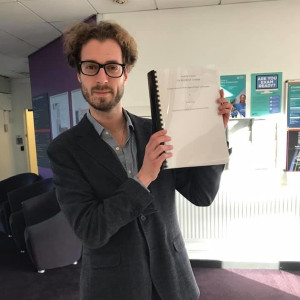Chapters
Is it madness? Is it lust? In today's world, anyone who murders simply to have company or freeze a moment in time is generally considered not all there. But then, we have visual spectacles of horror for the asking. Classics like Psycho and modern-day fare like Sweet Home. These, along with real-life, garden-variety killers have mostly inured us to murder. In Victorian times, things were substantially different. It was a time
- of idealised love where maidens' purity was all-important
- when women were supposed to be passive and weak
- of high society and gay parties where someone non-conforming would be shunned
- when a writer's career could be decimated by strong criticism
Such was the case for Lord Byron as well as for Robert Browning. Indeed, these two poets share a few parallels. They both died abroad, Byron at a young age. They both left England and they were both roundly criticised for their writings and actions. But Porphyria's Lover failed to attract much attention, at first. Let's go over it to find out why.

Overview of Porphyria's Lover
The poem introduces us to an unnamed man who loved and murdered a woman called Porphyria. We meet this character by hearing him speak in a dramatic monologue. He relates how Porphyria, a woman he loved (and who, presumably, loved him) visited him. But then, once she warms his house with her presence and by lighting a fire, he kills her so that they could be together forever.
Porphyria's Lover by Robert Browning
The rain set early in to-night,
The sullen wind was soon awake,
It tore the elm-tops down for spite,
And did its worst to vex the lake:
I listened with heart fit to break.
When glided in Porphyria; straight
She shut the cold out and the storm,
And kneeled and made the cheerless grate
Blaze up, and all the cottage warm;
Which done, she rose, and from her form
Withdrew the dripping cloak and shawl,
And laid her soiled gloves by, untied
Her hat and let the damp hair fall,
And, last, she sat down by my side
And called me. When no voice replied,
She put my arm about her waist,
And made her smooth white shoulder bare,
And all her yellow hair displaced,
And, stooping, made my cheek lie there,
And spread, o'er all, her yellow hair,
Murmuring how she loved me — she
Too weak, for all her heart's endeavour,
To set its struggling passion free
From pride, and vainer ties dissever,
And give herself to me for ever.
But passion sometimes would prevail,
Nor could to-night's gay feast restrain
A sudden thought of one so pale
For love of her, and all in vain:
So, she was come through wind and rain.
Be sure I looked up at her eyes
Happy and proud; at last I knew
Porphyria worshipped me; surprise
Made my heart swell, and still it grew
While I debated what to do.
That moment she was mine, mine, fair,
Perfectly pure and good: I found
A thing to do, and all her hair
In one long yellow string I wound
Three times her little throat around,
And strangled her. No pain felt she;
I am quite sure she felt no pain.
As a shut bud that holds a bee,
I warily oped her lids: again
Laughed the blue eyes without a stain.
And I untightened next the tress
About her neck; her cheek once more
Blushed bright beneath my burning kiss:
I propped her head up as before,
Only, this time my shoulder bore
Her head, which droops upon it still:
The smiling rosy little head,
So glad it has its utmost will,
That all it scorned at once is fled,
And I, its love, am gained instead!
Porphyria's love: she guessed not how
Her darling one wish would be heard.
And thus we sit together now,
And all night long we have not stirred,
And yet God has not said a word!
Check out the some of the most exceptional english tutor in Belfast here.
Dramatic Monologue
Robert Browning did not invent the dramatic monologue but he is the most famous user of the form. He became a household name to the Victorians for his book called Dramatic Monologues which included this and many other poems, each from the perspective of a different character, either invented, drawn from history or literature.
His 'My Last Duchess' is another well-known example. Like this poem, Duchess slowly reveals the narrator's twisted character. Some of these monologues imagine that the speaker is in conversation with the reader, who never has a chance to reply. Others are more isolated, as though the speaker is talking to himself, to God, or anybody at all.
You can search for the best english tutor in Wolverhampton here.

Characters in Porphyria's Lover
The speaker seems sociopathic. He is not disturbed by his actions, he comments on them as if from a distance. He appears amazed and amused that despite what he has been told, "god has not said a word" about his actions. All night he sat with her without god smiting him for his act of murder. And as soon as he realises that "she was mine, mine" he says that he "found a thing to do". As if a casual idea had suddenly suggested itself to him. But his actions do not seem impulsive.
He says that Porphyria now has her "utmost will" but he delighted in killing her. From that moment, he concluded she belonged to him - "at last... Porphyria worshipped me". Whatever their previous relationship was like, the speaker seems to think that he can stop time and keep things as they are. He revels in the silence and stillness ("And all night long we have not stirred").
He seems happier in complete control, nearly exultant. Early in the poem, he seems to have been jealous. He believed that Porphyria shared her affection for him with others. She's "Too weak..." to ignore the relationships he calls "vainer" and "give herself to me forever".
Porphyria is a mystery. She seems to have a genuine affection for the speaker. She visits him in his lonely rural dwelling. She makes the fire and initiates conversation and physical intimacy. Porphyria has left a "gay feast" (as in a joyful, or celebratory meal) to come and visit "one so pale | For love of her". She appears to pity or, at least, feel compassion for the lover, who seems to have been sulking in a cold and unlit room watching the rain.
Scholars have posited she may be a devoted sister for whom he has incestuous feelings. Whoever she is, she's a lady of some standing, used to wearing a cloak, shawl and gloves. And attending gay feasts. Did she know how dangerous this man was? Was his passion for her truly reciprocated, or was she simply pitying him? There is much unexplained at the end of the poem.

Themes Explored in Porphyria's Lover
Many believe that madness must be this poem's overarching theme. When you consider that this work and another were initially published as Madhouse Cells, it's easy to come to that conclusion. But madness is not this work's theme. Love and jealousy are. We probably don't have to point out the love aspects, do we? Jealousy, on the other hand, is harder to spot. He wanted her for himself. He was afraid she would eventually transgress against him. So he killed her to keep her with him.
That sets up our next major themes: control and violence. The narrator seemingly has little control over himself. He doesn't go out, light the fire or greet his beloved. However, he exerts full control over her. She leaves the gay feast to attend to him. She makes his cottage cheerful and forces his embrace. He senses she might soon escape his control. He ensures that will never happen with a single violent act.
Now with full control over her, he gloats over God not reproaching him. There's substantial hypocrisy here. He murders Porphyria - an immoral act, to save her from committing immoral acts, probably of a sexual nature. The poem is laden with sexual references, another nod to morality as a dominant theme. The ultimate hypocrisy, however, is condemning Porphyria to death for embracing her sexuality. Victorian women were meant to be pure and chaste. Heaven forbid any of them to flash a bare shoulder around!
Get to discover some of the most effective english tutor in Cardiff here.

Language and Poetic Devices
Language
The speaker uses diminutives to describe Porphyria, showing that he views her as small and less powerful than himself. He winds her hair around "her little throat" to suffocate her. And then, he props her up against his shoulder where her "smiling rosy little head" rests.
The control theme carries through even in the composition. Browning shows exquisite control of the written word by using end-stops and enjambments. 'No pain, felt she | I'm quite sure she felt no pain.' is a sterling example of a dual end-stop. Its opposite, enjambments, propels the reader and the idea forward. 'Be sure I looked up at her eyes | Happy and proud; at last I knew' This enjambment conveys the urgency the narrator feels at having to execute his plan.
Form
Porphyria's Lover is written in a continuous form, not separated into stanzas. A rhyme scheme works in five-line sections (cinquains), but abundant enjambement and the continuing monologue means that these sections rarely stand alone.
Browning repeats the rhyme of every fourth line into the fifth. He thus created a form that includes regular couplets, which he can use for emphasis or rhythm. This rhyme pattern can be analysed as ABABB and the meter is a fairly regular iambic quadrameter throughout the poem.
In fact, at times the regularity of the rhythm makes the speaker sound even more robotic and unemotional. For example, the line "The smiling rosy little head" has a sing-song, child-like quality that makes the description particularly shallow. The speaker compares her dead eye "As a shut bud that holds a bee". This pattern change slightly alters the rhythm to start with two weak beats, then two strong, before continuing with iambs. But this is the limit of the variation: even when Porphyria's lover describes how he killed her, he continues mechanically on.
Porphyria's Lover Symbols
In style and substance, Robert Browning and William Shakespeare are miles apart. For instance, the Bard's Blow, Blow Thou Winter Wind is a direct criticism of the coldness humans are capable of. By contrast, there's so much we're not sure of in this Browning work. Lucky for us, he's scattered plenty of clues throughout so we can more readily guess his meaning.
Take those soiled gloves, for instance. The narrative tells us it was a beastly day. Her cloak and shawl were sodden messes. Why make an extra point of describing her gloves - and why say they're soiled? Because 'soiled' means 'no longer clean and pure' - as in sexually tainted. Later in the poem, he expresses worry over her possible future transgressions. Saying that her hand coverings are soiled suggests he believes she has already committed an immoral act.
The gay feast tells us that Porphyria has a busy social life. She belongs to a world that he doesn't. But she still makes time to come to him, light his fire - literally and figuratively, and pepper him with questions. With this revelation, we find the reason he wanted her all to himself.
Browning dwells on skin tone. First, he's pale - A sudden thought for one so pale | for love of her and all in vain. And then Porphyria's blush returns to her cheeks as he releases his stranglehold of her. 'Pale' was a common way to describe intense feelings of love in those times, especially if it was the type of love one could faint dead away for. The blush has far more meaning. It may suggest that Porphyria has returned to her demure state - blushing was quite common for demure young ladies. Or it could mean that his crime did not change her, of which he was surely glad.
Do you know you can find some of the best qualified english tutor in Coventry here?

Final Thoughts on Porphyria's Lover
When you encountered this poem for the first time, did it occur to you that this unfortunate girl had a very odd name? Search as you might through baby name websites, you'll get no results. If you search the internet for 'porphyria' - spelt exactly that way, you'll find information about some type of liver disease. What poet would name a tragic heroine after a disease?
Robert Browning would. He liked to keep abreast of all scientific advances, particularly in medicine. Although Hippocrates described the disease, it had recently re-emerged in academic circles. He may have chosen to name this poor girl thus to signal his knowledge of the latest scientific discussions. Or maybe he just liked the colour purple. That's porphyra, in Greek.
Porphyria symptoms include anxiety, delusions and hallucinations. Wouldn't you know it? Those are the very things that Browning suggests his anti-hero suffers from. He's so anxious he can't bear to join the 'gay feast' so he sits at home, alone. He deludes himself into believing that Porphyria didn't suffer and that she wanted and welcomed death. And at the end, he waits to hear God's judgment but his hallucination fails to materialise.
Browning may also have tried to imply that murdering Porphyria in the flesh was vanquishing a disease the anti-hero himself suffered from. Sure, there would be lingering traces once disease fled the body. There might be scars or other visible markings. Or the weight of a small, still head resting on one's shoulder.
This narrative poem is certainly gruesome, far from the triumph heralded in Charge of the Light Brigade. Porphyria's Lover is rich in language and symbolism. It reveals genuine emotion, albeit in an abstract way. And it presents many convoluted layers that readers might not spot unless they knew about the author, his passions and his concerns.
















